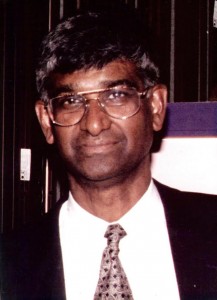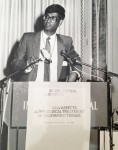Bramah Singh, a renowned UCLA cardiologist known for his cutting-edge ideas and dry sense of humor, died Sept. 20 at the age of 76 at his home in Encino.
Along with his expertise in cardiology, Singh was known for his wide variety of interests, coming home to spend hours digging and planting in the garden, reading from his extensive book collection and playing with his children.
Singh was recognized early on for his understanding of cardiology while writing his thesis at Oxford University in 1971, where he identified properties of amiodarone and sotalol, two anti-arrhythmic medications. He then co-created the Singh Vaughan Williams classification system for all anti-arrhythmic drugs, which is still used in most medical schools.
Born in 1938 in the Fiji Islands to a family of poor farmers, Singh took on extra work to contribute money to the family while studying for school. The fourth of 10 children, he was able to get an after-school job at his high school to help make ends meet, said his brother, Nirbhay Singh.

“He was really brilliant, but we were very poor,” Nirbhay Singh said. “When the school realized how poor we were, they gave him a job. He had to have the time to study, have the time to work and to look after the rest of us.”
Singh would wake up at 3 or 4 a.m. and would study by the light of a kerosene lantern because the family did not have electricity. He would also study by lantern light late into the night after returning from work.
Singh’s study habits helped him get into the University of Otago in New Zealand in 1963 for his medical degree. After obtaining his doctorate at Oxford University, Singh joined UCLA as a professor of cardiology in 1980 and was the chief of cardiology from 1988 to 1996. He retired from UCLA in 2009.
Because of his academic success and personal drive, he was a leader among his siblings, helping many to medical degrees of their own, Nirbhay Singh said.
“He was always focused on helping his family. He devoted himself to family issues and wanted his brothers and sisters to do well in school,” Nirbhay Singh said.
Nirbhay Singh said his brother would encourage the rest of his siblings to memorize poetry by Yates or Tennyson and would help his parents in the garden.
Bramah Singh’s love for literature and gardening continued into his adult life, said his son Sanjiv Singh, which he said was evident in his expansive home library and the hours he spent in his garden.
Bramah Singh had an incredible green thumb, his son said. He would buy plants at the store and spend hours digging in the front and back of the house, covering himself in dirt. A perfectionist when it came to his garden, Bramah Singh would replant and reorganize the plants to keep them thriving.
But Sanjiv Singh said he will most remember his father for his modesty about his accomplishments and his desire to spend time with his children.
“As a child, I was not aware of what he had done in medicine and cardiology,” Sanjiv Singh said. “He never spoke about his work, he asked what we had done that day, what our homework was … despite being an intellectual giant, (he would) sit down and watch silly TV shows with no pretenses.”
In addition to his focus on family when at home, Singh encouraged his children to explore many career options and to be well-educated.
Sanjiv Singh said that when he started considering going into medicine after years in business, he approached his father to ask for advice.
“One day at dinner, I said, ‘I know this will sound off and crazy, but I’m thinking of getting an MD,’” Sanjiv Singh said. “He looked at me, not blinking, and said, ‘If you put your mind to it, you can do it.’”
Singh is survived by his wife, Roshni Singh, and his children Pramil, Sanjiv and Nalini Singh. A private service was already held, but a tentative memorial service is being planned for March 2015.
Compiled by Julia Raven, Bruin senior staff.
Email Hoff at jraven@media.ucla.edu.
